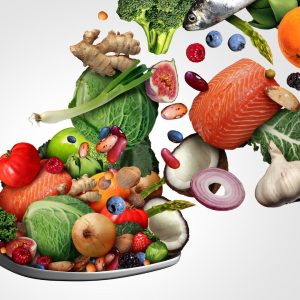
When it comes to maintaining a healthy diet and achieving fitness goals, understanding macronutrients is fundamental. Macronutrients, often referred to as macros, are the essential nutrients our bodies require in large quantities to function optimally. The three primary macronutrients are carbohydrates, proteins, and fats. In this comprehensive guide, we will delve into the science behind these macronutrients, their roles in the body, and how to incorporate them into your diet for a balanced and healthy lifestyle.
Carbohydrates: The Body’s Preferred Energy Source
Carbohydrates are often the main source of energy for the body. They are composed of carbon, hydrogen, and oxygen atoms and can be classified into two categories: simple and complex carbohydrates.
1. Simple Carbohydrates: These are made up of one or two sugar molecules and are quickly digested and absorbed by the body. Foods high in simple carbohydrates include table sugar, candy, soda, and fruit juices. While they provide a rapid energy boost, they can lead to blood sugar spikes and crashes.
2. Complex Carbohydrates: These are composed of long chains of sugar molecules, and they take longer for the body to break down and absorb. Foods rich in complex carbohydrates include whole grains, legumes, vegetables, and fruits. They provide a steady and sustained source of energy, making them a better choice for overall health.
The Role of Carbohydrates in the Body
Carbohydrates play several critical roles in the body:
1. Energy Production: Carbohydrates are the body’s primary source of energy. When consumed, they are broken down into glucose, which is used by cells for fuel. Any excess glucose is stored in the liver and muscles as glycogen for future use.
2. Brain Function: Glucose from carbohydrates is essential for proper brain function. The brain relies heavily on a constant supply of glucose to perform cognitive tasks effectively.
3. Muscle Function: Carbohydrates are crucial for athletes and individuals engaging in physical activities. They provide the necessary energy to perform strenuous exercises and support muscle recovery.
4. Digestive Health: Complex carbohydrates, especially dietary fiber found in whole grains and vegetables, aid in digestion by promoting regular bowel movements and maintaining a healthy gut.
How to Incorporate Carbohydrates into Your Diet
To ensure a balanced intake of carbohydrates, consider the following tips:
1. Choose Whole Grains: Opt for whole grains like brown rice, quinoa, oats, and whole wheat bread instead of refined grains like white rice and white bread. Whole grains provide more nutrients and fiber.
2. Eat a Variety of Fruits and Vegetables: Consume a diverse range of colorful fruits and vegetables to get a wide array of nutrients and fiber.
3. Control Sugar Intake: Limit your consumption of sugary snacks, candies, and sugary beverages, as excessive sugar can lead to health issues like obesity and diabetes.
4. Balance Carbohydrates with Protein and Fat: Pair carbohydrates with lean proteins and healthy fats to create balanced meals that provide sustained energy and keep you feeling full.
Proteins: The Building Blocks of Life
Proteins are essential macronutrients that are crucial for the growth, repair, and maintenance of body tissues. They are composed of amino acids, which are the building blocks of protein molecules. There are 20 different amino acids, and the body can synthesize some of them, while others must be obtained through the diet and are called essential amino acids.
The Role of Proteins in the Body
Proteins serve various vital functions in the body:
1. Tissue Repair and Growth: Proteins are responsible for repairing and building tissues, making them crucial for muscle growth and recovery.
2. Enzymes and Hormones: Many enzymes and hormones in the body are made of protein and play essential roles in various metabolic processes.
3. Immune System Support: Antibodies, which are critical components of the immune system, are proteins that help the body fight infections and diseases.
4. Transportation: Proteins like hemoglobin transport oxygen in the blood, while lipoproteins transport fats in the bloodstream.
How to Incorporate Proteins into Your Diet
To ensure an adequate intake of protein, consider the following tips:
1. Diversify Protein Sources: Incorporate a variety of protein sources into your diet, including lean meats, poultry, fish, eggs, dairy products, legumes, and plant-based sources like tofu and tempeh.
2. Portion Control: Pay attention to portion sizes to avoid overconsumption, as excess protein can be stored as fat or put stress on the kidneys.
3. Prioritize Lean Proteins: Choose lean cuts of meat, remove visible fats, and opt for skinless poultry to reduce saturated fat intake.
4. Balance Protein Intake: Balance your protein intake with carbohydrates and fats for a well-rounded diet that meets your nutritional needs.
Fats: More Than Just Energy Storage
Fats, often vilified in the past, are essential for the body’s overall health and function. They are composed of carbon, hydrogen, and oxygen atoms and can be categorized into saturated fats, unsaturated fats, and trans fats.
1. Saturated Fats: These fats are typically solid at room temperature and are commonly found in animal products like meat and dairy, as well as some tropical oils like coconut and palm oil. Excessive consumption of saturated fats can contribute to heart disease.
2. Unsaturated Fats: These fats are typically liquid at room temperature and are considered healthy fats. They are found in foods like olive oil, avocados, nuts, and fatty fish. Unsaturated fats can help reduce the risk of heart disease when consumed in moderation.
3. Trans Fats: These fats are artificially created through a process called hydrogenation and are often found in processed and fried foods. Trans fats are known to increase the risk of heart disease and should be avoided.
The Role of Fats in the Body
Fats are vital for various bodily functions:
1. Energy Storage: Fats are the body’s primary long-term energy storage mechanism. They provide a concentrated source of energy, especially during times of low food intake.
2. Cell Membranes: Fats are essential components of cell membranes, where they play a role in maintaining cell structure and function.
3. Absorption of Fat-Soluble Vitamins: Vitamins A, D, E, and K are fat-soluble, meaning they require dietary fat for proper absorption in the body.
4. Insulation and Protection: Fats provide insulation to keep the body warm and protect vital organs from injury.
How to Incorporate Fats into Your Diet
To ensure a balanced intake of fats, consider the following tips:
1. Choose Healthy Fats: Opt for sources of healthy fats like avocados, nuts, seeds, and olive oil. These fats provide essential nutrients without the negative health effects associated with saturated and trans fats.
2. Limit Saturated and Trans Fats: Reduce your intake of saturated and trans fats by avoiding processed and fried foods, as well as choosing lean cuts of meat and low-fat dairy products.
3. Portion Control: While fats are essential, they are calorie-dense, so be mindful of portion sizes to maintain a healthy weight.
4. Omega-3 Fatty Acids: Include sources of omega-3 fatty acids in your diet, such as fatty fish (e.g., salmon, mackerel), flaxseeds, and walnuts, as they have numerous health benefits, including reducing inflammation and supporting heart health.
Finding the Right Macronutrient Balance
The ideal macronutrient balance varies from person to person, depending on factors such as age, gender, activity level, and specific health goals. Here are some general guidelines to help you find the right balance for your needs:
1. Determine Your Caloric Needs: Calculate your daily calorie needs based on factors like age, gender, activity level, and weight goals. This serves as a starting point for your macronutrient distribution.
2. Set Protein Goals: Aim to consume an adequate amount of protein to support your muscle maintenance and growth. A common recommendation is around 10-35% of your daily calorie intake, with athletes and active individuals needing more protein.
3. Allocate Carbohydrates Wisely: Allocate carbohydrates based on your activity level. Active individuals may require a higher percentage of carbohydrates for energy, while those with sedentary lifestyles may benefit from a lower carbohydrate intake.
4. Choose Healthy Fats: Aim to include healthy fats in your diet while minimizing saturated and trans fats. Approximately 20-35% of your daily calories can come from fats, with an emphasis on unsaturated fats.
5. Monitor and Adjust: Pay attention to how your body responds to your macronutrient intake. Adjust your ratios as needed to achieve your goals, whether they involve weight loss, muscle gain, or improved overall health.
Conclusion
Understanding macronutrients—carbohydrates, proteins, and fats—is essential for making informed dietary choices that support your health and fitness goals. Each macronutrient plays a unique and vital role in the body, and finding the right balance among them is key to achieving and maintaining a healthy lifestyle. By prioritizing whole foods, diversifying your nutrient sources, and monitoring your intake, you can optimize your macronutrient consumption and embark on a journey toward improved well-being and vitality. Remember that consulting with a healthcare professional or registered dietitian can provide personalized guidance tailored to your specific needs and goals.

